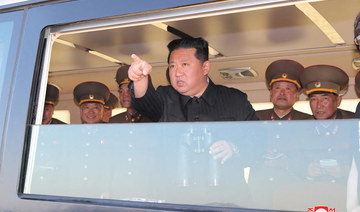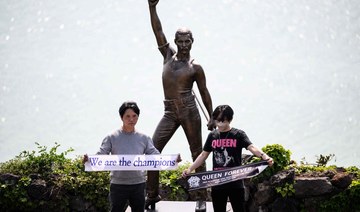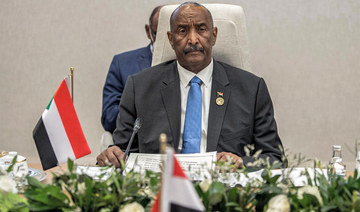SEOUL, South Korea: North Korean leader Kim Jong Un vowed to bolster his nuclear forces at “maximum speed” and threatened to use them if provoked in a speech he delivered during a military parade that featured powerful weapons systems targeting the United States and its allies, state media reported Tuesday.
His remarks suggest he will continue provocative weapons tests in a pressure campaign to wrest concessions from the US and other rivals. The parade Monday night was to mark the 90th anniversary of North Korea’s army — the backbone of the Kim family’s authoritarian rule — and comes as the country faces an economy battered by pandemic-related difficulties, punishing US-led sanctions and its own mismanagement.
“We will continue to implement measures aimed at strengthening and developing our country’s nuclear forces at the maximum speed,” Kim told his troops and the crowd gathered for the parade at a Pyongyang plaza, according to the official Korean Central News Agency.
“The fundamental mission of our nuclear forces is to deter war, but if an undesirable situation emerges on our land, our nuclear forces cannot be limited to a single mission of preventing war,” Kim said. “If any forces, regardless of who they are, try to infringe upon our fundamental interests, our nuclear forces will have no choice but to absolutely carry out its unexpected second mission.”
The parade featured marching troops shouting “hurrah!” and an array of modern weapons including missiles potentially capable of reaching the US homeland as well as shorter-range missiles that can be fired from land vehicles or submarines and threaten South Korea and Japan.
One of the weapons showcased at the brightly illuminated Kim Il Sung Squar,e named after Kim’s late grandfather and state founder, was North Korea’s biggest, newly built intercontinental ballistic missile, the Hwasong-17.
North Korea claimed to have test-fired that missile last month in its first full-range ICBM liftoff in more that four years. South Korea disputed that, saying North Korea launched a smaller, existing Hwasong-15 ICBM following a failed launch of the Hwasong-17. Despite the outside doubts, the missile fired on March 24 flew longer and higher than any other missile North Korea has launched, demonstrating potential ability to reach deep into the US mainland.
KCNA said spectators at the parade raised loud cheers when they saw the Hwasong-17, which it said showed “the absolute power of Juche (self-reliance), Korea and the strategic position of our republic to the world.”
North Korea often commemorates key state anniversaries with huge fanfare to boost an internal unity. Tuesday’s KCNA dispatch praised Kim for accomplishing “the historic great cause of completing the nuclear forces by making a long journey of patriotic devotion with a death-defying will in order to make sure that the people would eternally enjoy happiness free from the horrors of war generation after generation.”
Kim has also been reviving nuclear brinkmanship aimed at forcing the United States to accept North Korea as a nuclear power and to remove crippling economic sanctions. Analysts say North Korea is exploiting a favorable environment to push forward its weapons program as the UN Security Council remains divided over Russia’s war in Ukraine.
Nuclear negotiations between Washington and Pyongyang have been stalled since 2019 because of disagreements over the potential easing of US-led sanctions in exchange for North Korean disarmament steps. Kim has stuck to his goals of simultaneously developing nuclear weapons and the country’s dismal economy in the face of international pressure and has shown no willingness to fully surrender a nuclear arsenal he sees as his biggest guarantee of survival.
North Korea has conducted 13 rounds of weapons tests this year, including its claimed launch of the Hwasong-19. There are also signs North Korea is rebuilding tunnels at a nuclear testing ground that was last active in 2017, possibly in preparation for exploding a nuclear device.
In 2017, North Korea claimed to have acquired an ability to launch nuclear strikes on the US mainland after a torrid run of nuclear and missile tests. The North had halted such high-profile tests before it entered the now-dormant diplomacy with the United States.
The North has spent much of the past three years focusing on expanding its short-range arsenal targeting South Korea as nuclear negotiations with the United States stalled.
Kim’s aggressive military push could also be motivated by domestic politics since he doesn’t otherwise have significant accomplishments to show to his people as he marks a decade in power. He failed to win badly needed sanctions relief from his diplomacy with then-President Donald Trump, and the COVID-19 pandemic unleashed further shocks to the country’s broken economy, forcing him to acknowledge last year that North Korea was facing its ” worst-ever situation.”
North Korea’s Kim vows to bolster nuke capability during parade
https://arab.news/2eatd
North Korea’s Kim vows to bolster nuke capability during parade
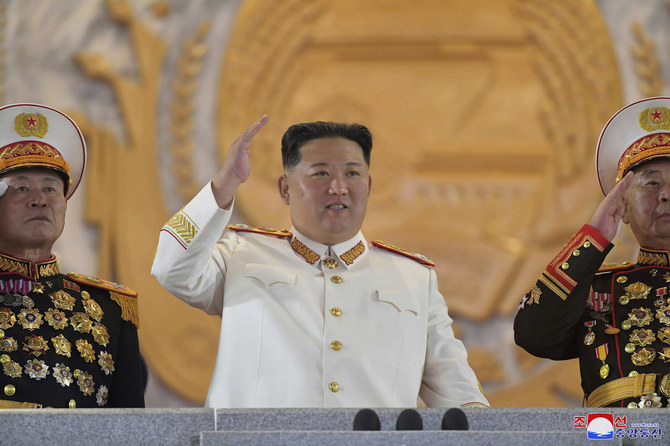
- His remarks suggest he will continue provocative weapons tests in a pressure campaign to wrest concessions from the US and other rivals
- North Korea often commemorates key state anniversaries with huge fanfare to boost an internal unity
India protests separatist slogans allowed at Toronto event
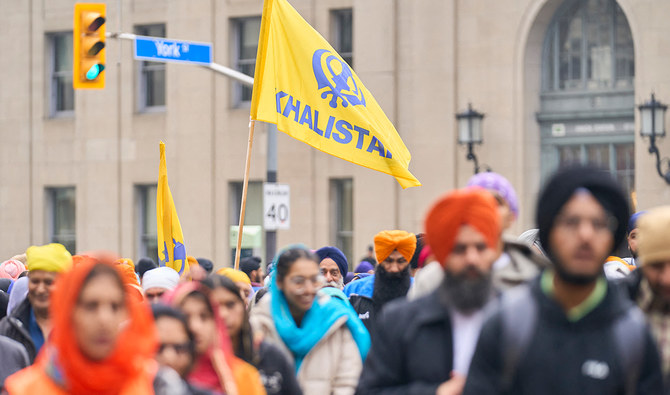
- Bilateral relations soured last year after Canada linked Indian agents to June 2023 murder of its national
- Hardeep Singh Nijjar, 45, was shot dead outside a Sikh temple in Surrey, which has a large Sikh population
NEW DELHI: India summoned the Canadian Deputy High Commissioner on Monday and expressed “deep concern and strong protest” after separatist slogans in support of a Sikh homeland were raised at an event addressed by Prime Minister Justin Trudeau.
Bilateral diplomatic relations soured last year after Trudeau said Canada was “actively pursuing credible allegations” that Indian agents were potentially linked to the June 2023 murder of a Canadian citizen.
Hardeep Singh Nijjar, 45, was shot dead outside a Sikh temple on June 18 in Surrey, a Vancouver suburb with a large Sikh population. Nijjar supported a Sikh homeland in the form of an independent Khalistani state and was designated by India as a “terrorist” in July 2020.
New Delhi has denied any formal government role in Nijjar’s murder.
India’s foreign affairs ministry said on Monday it had conveyed “deep concern and strong protest” at such actions “being allowed to continue unchecked at the event.”
Slogans supporting the rise of a separatist state were raised at an event in Toronto, according to ANI news agency, in which Reuters has a minority stake.
“We will always be there to protect your rights and your freedoms, and we will always defend your community against hatred and discrimination,” ANI reported Trudeau as saying.
Canada has the highest population of Sikhs outside their home state of Punjab in India, and the country has been the scene of many demonstrations that have irked India.
The Canadian foreign ministry did not immediately respond to a request for comment.
UN asks South Sudan to remove new taxes that led to a pause in food airdrops
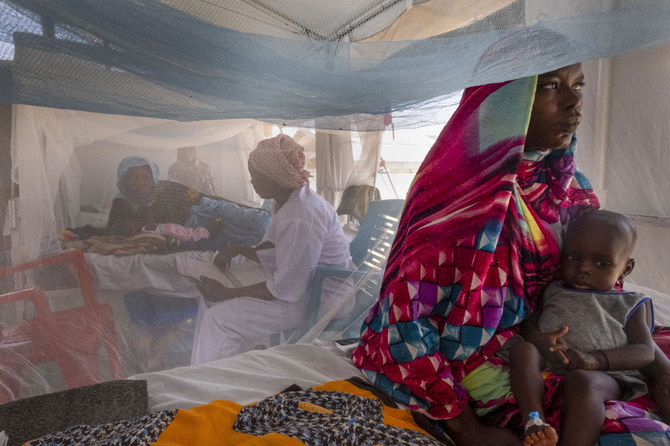
- UN said that pausing of airdrops in March had deprived of food 60,000 people who live in areas that are inaccessible by road
JUBA: The United Nations has urged South Sudan to remove newly imposed taxes and charges that led to the suspension of UN food airdrops for thousands of people who depend on outside aid.
The UN Humanitarian Affairs Agency said Monday in a statement that the pausing of airdrops in March had deprived of food 60,000 people who live in areas that are inaccessible by road, and their number is expected to rise to 135,000 by the end of May.
The UN said the new charges would have increased operational costs to $339,000 monthly, which it says is enough to feed over 16,300 people. The new charges introduced in February are related to electronic cargo tracking, security escort fees and new taxes on fuel.
“Our limited funds are spent on saving lives and not bureaucratic impediments,” Anita Kiki Gbeho, the UN humanitarian coordinator for South Sudan, said.
UN spokesman Stéphane Dujarric said in New York that the taxes and charges are also impacting the nearly 20,000-strong UN peacekeeping mission in South Sudan, “which is reviewing all of its activities, including patrols, the construction of police stations, schools and health care centers, as well as educational support.”
The UN says the South Sudan government had said it would remove the new charges and taxes but had not committed to it in writing since February.
An estimated 9 million people out of 12.5 million people in South Sudan need protection and humanitarian assistance, according to the UN The country has also seen an increase in the number of people fleeing the war in neighboring Sudan, further complicating humanitarian assistance to those affected by the internal conflict.
French police remove pro-Palestinian students from the courtyard of Sorbonne university in Paris
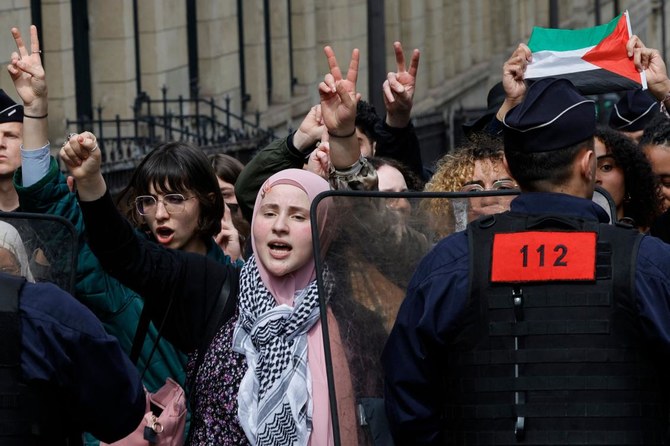
- About 50 protesters set up tents at midday Monday at the elite university’s courtyard
PARIS: French police removed dozens of students from the Sorbonne university after pro-Palestinian protesters occupied the main courtyard of the elite institution in Paris on Monday.
About 50 protesters set up tents at midday Monday at the Sorbonne university courtyard in support of Palestinians, echoing similar encampments and solidarity demonstrations across the United States.
Protesters unveiled a giant Palestinian flag and chanted slogans in support of Palestinians in Gaza, as Israel continues its offensive following the deadly Oct. 7 Hamas attack that triggered the Israeli-Hamas war. Police entered the university grounds in the early afternoon and removed them.
About 100 demonstrators took part in the protest near the prestigious university amid heavy police presence that were also guarding the university entrance to prevent students from setting up camp inside again.
Lorelia Frejo, a graduate student at the Sorbonne who joined a protest outside the university, said police used force to remove her peers from the courtyard. “They were peaceful and police took them out with no explanation,” Frejo said. Students in Paris were inspired by the protests at New York’s Columbia University who remain steadfast despite police pressure, she added.
“They (Columbia protesters) are very strong and want to fight for justice and for peace in Palestine,” Frejo said.
The Sorbonne occupies a unique place at the heart of French public and intellectual life. Last week, President Emmanuel Macron chose it as the venue to deliver a speech on his vision of Europe ahead of elections for the European Parliament in June.
Last week protests broke out at another elite university in the French capital region, the Paris Institute of Political Studies, known as Sciences Po, which counts Macron and Prime Minister Gabriel Attal among its many famous alumni.
Tensions had broken out on campus as pro-Palestinian students inspired by Gaza solidarity encampments at campuses in the United States sought to occupy an amphitheater.
On Friday, pro-Palestinian and pro-Israeli demonstrators faced each other in a tense standoff in the street outside the school. Riot police stepped in to separate the opposing groups.
The protest ended peacefully, when students agreed to evacuate the building late on Friday. The head of Sciences Po said an agreement with students had been reached.
Afghan Taliban’s treatment of women under scrutiny at UN rights meeting
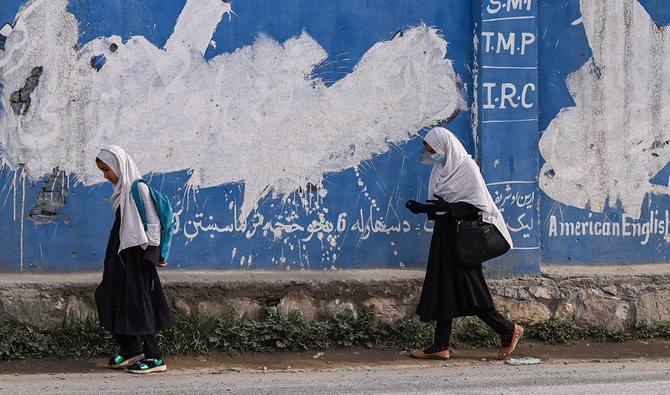
- The Taliban say they respect rights in line with their interpretation of Islamic law
- Taliban have barred girls from high school and women from universities and jobs
GENEVA: Afghanistan’s Taliban face criticism over their human rights record at a UN meeting on Monday, with Washington accusing them of systematically depriving women and girls of their human rights.
However, in an awkward first for the UN Human Rights Council, the concerned country’s current rulers will not be present because they are not recognized by the global body.
Afghanistan will instead be represented by an ambassador appointed by the previous US-backed government, which the Taliban ousted in 2021.
In a series of questions compiled in a UN document ahead of the review, the United States asked how authorities would hold perpetrators to account for abuses against civilians, “particularly women and girls who are being systematically deprived of their human rights“?
Britain and Belgium also raised questions about the Taliban’s treatment of women. In total, 76 countries have asked to take the floor at the meeting.
The Taliban say they respect rights in line with their interpretation of Islamic law.
Since they swept back into power, most girls have been barred from high school and women from universities. The Taliban have also stopped most Afghan female staff from working at aid agencies, closed beauty salons, barred women from parks and curtailed travel for women in the absence of a male guardian.
Under the US system, states’ human rights records are subject to peer review in public meetings of the Geneva-based Human Rights Council, resulting in a series of recommendations.
While non-binding, these can draw scrutiny of policies and add to pressure for reform.
The UN Human Rights Council, the only intergovernmental global body designed to protect human rights worldwide, can also mandate investigations whose evidence is sometimes used before national and international courts.
Indian students protest US envoy’s campus talk over Gaza war
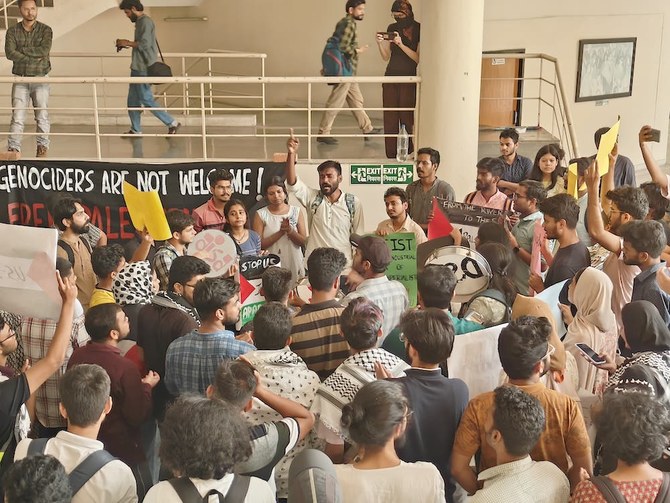
- Student-led protest led to university canceling an event involving US ambassador
- Indian students say they stand in solidarity with students protest across US
NEW DELHI: Students at one of India’s most prominent universities gathered in protest over an event involving the US ambassador to New Delhi on Monday, as they stood up against American support for Israel’s war on Gaza.
US Ambassador to India Eric Garcetti was invited for a talk on US-India ties at the Jawaharlal Nehru University in New Delhi on Monday afternoon, which would take place amid protests on American campuses demanding their universities cut financial ties with Israel over its military offensive in Gaza, which has killed more than 34,000 Palestinians.
At the university’s convention center, over 100 students organized by the Jawaharlal Nehru University Student Union protested the invitation of Garcetti, calling out his complicity “in the genocide Israel is currently doing in Palestine.”
JNUSU President Dhananjay told Arab News: “By calling such a person in the university … who is supporting the genocide, we want to tell them that JNU is not silent on this issue and we want to speak up.
“We are protesting against the US support for the genocide in Gaza committed by Israel.”
Hundreds of US college students have been arrested and suspended as peaceful demonstrations calling for a ceasefire in Gaza and divestment from companies linked to Israel spread across American campuses.
The student-led movement comes after nearly six months since Israel began its onslaught on the Gaza Strip, which Tel Aviv said was launched to stamp out the militant group Hamas.
Hundreds of thousands of housing units in the besieged territory have either been completely or partially destroyed, while the majority of public facilities, schools and hundreds of cultural landmarks have been demolished and continue to be targeted in intense bombing operations.
JNU student leaders said they stood in solidarity with the protesting students in the US.
“We are students, and we need to ask questions. If some atrocities are taking place and there are mindless killings going on, speaking out against this should be the responsibility of all sections of society,” Dhananjay said.
“The visuals that we see make us shiver and shake our conscience. If we don’t speak up, then I don’t think we have a right to be a social being.”
At the JNU campus on Monday, the student protest led to a cancellation of the event involving the US envoy.
“We feel happy that we forced the administration to cancel the talks by the ambassador,” JNUSU Vice President Avijit Ghosh told Arab News.
Despite India’s historic support for Palestine, the government has been mostly quiet in the wake of Israel’s deadly siege of Gaza.
When Indians went to the streets in the past months to protest and raise awareness on the atrocities unfolding in Gaza, their demonstrations were dispersed by police and campaigns stifled.
Members of Indian civil society have since come together to challenge their government’s links with Tel Aviv and break Delhi’s silence on Israel’s war crimes against Palestinians, reflecting similar concerns that some university students also felt.
“The US is supporting Israel in the killing of Palestinian people in Gaza. It’s also suppressing students in its country who are raising voice against the genocide in Gaza,” Ghosh said.
“We are agitated that India is being a mute spectator and not taking a clear stand against the ongoing genocide in Gaza.”



